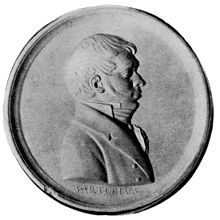Georg Friedrich Sartorius
Georg Friedrich Sartorius hereditary Bavarian baron since 1827 as von Waltershausen (born August 25, 1765 in Kassel , † August 24, 1828 in Göttingen ) was a German historian and professor at the University of Göttingen .
Career
Sartorius was born in Kassel, where he passed his Abitur at the Carolinum grammar school. He then studied theology and oriental studies in Göttingen (the latter with Michaeli ). He gained a certain closeness to the young Göttingen and also wrote several contributions to the Göttingen Musenalmanach , which, however, were ignored even then. He later switched to the subject of history and began working at an early age as an employee of the Göttingen University Library , of which he became curator in 1794. In 1797 he was appointed associate professor at the Philosophical Faculty and in 1802 he was appointed full professor of history in Göttingen. He turned down numerous calls from other universities throughout his life.
His main work is the history of the Hanseatic League. which appeared in three volumes from 1802 to 1808. His research on this topic justified the extensive research on the Hanseatic League in the 19th century, which, particularly in the course of the unification of the empire in the second half of the century, took up this topic with temporarily transfigured euphoria. A second edition of the work, prepared by Sartorius himself, appeared post mortem in 1830. He was also known as the translator of Adam Smith Wealth of Nations . As an economic historian and economist, he also gave lectures on tax law.
In 1810 he was elected a full member of the Göttingen Academy of Sciences . In December 1826 he was elected a corresponding member of the Russian Academy of Sciences in Saint Petersburg .
family
Goethe was the godfather of his second son, the geologist and well-known Etna researcher Wolfgang Sartorius von Waltershausen .
Shortly before his death, Sartorius acquired the Lower Franconian Waltershausen Castle in Grabfeld, along with the extensive estates belonging to it, using funds from an inheritance that had fallen to his wife. Waltershausen was originally owned by the von Kalb family. With the acquired property the acquisition of the baron class of the hereditary Bavarian nobility was connected. From then on the family called themselves Sartorius von Waltershausen or simply von Walterhausen . The property remained in the family until the 20th century. The palace was taken over by the Reichspost as a rest home in 1944 .
literature
- Ferdinand Frensdorff : Sartorius von Waltershausen, Georg Freiherr . In: Allgemeine Deutsche Biographie (ADB). Volume 30, Duncker & Humblot, Leipzig 1890, pp. 390-394.
- Else von Monroy: Goethe's correspondence with Georg and Caroline Sartorius (from 1801-1825): With 15 new Goethe letters and many other unknown documents from Goethe's time. Weimar: Böhlau 1931
Individual evidence
- ↑ Holger Krahnke: The members of the Academy of Sciences in Göttingen 1751-2001 (= Treatises of the Academy of Sciences in Göttingen, Philological-Historical Class. Volume 3, Vol. 246 = Treatises of the Academy of Sciences in Göttingen, Mathematical-Physical Class. Episode 3, vol. 50). Vandenhoeck & Ruprecht, Göttingen 2001, ISBN 3-525-82516-1 , p. 209.
- ^ Foreign members of the Russian Academy of Sciences since 1724. Georg Sartorius. Russian Academy of Sciences, accessed October 21, 2015 .
| personal data | |
|---|---|
| SURNAME | Sartorius, Georg Friedrich |
| BRIEF DESCRIPTION | German historian and professor at the University of Göttingen |
| DATE OF BIRTH | August 25, 1765 |
| PLACE OF BIRTH | kassel |
| DATE OF DEATH | August 24, 1828 |
| Place of death | Goettingen |

